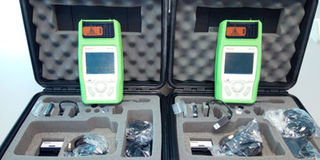New machines boost war on counterfeit drugs

Raman Spectrometers acquired by the Pharmacy and Poisons Board. They will enhance the surveillance of substandard and counterfeit medicines including those sold in Pharmacies as well as those imported into the country. PHOTO | ELIZABETH MERAB | NATION MEDIA GROUP
What you need to know:
- Last week the drug regulator acquired two specialised handheld gadgets (each cost Sh500,000) for screening medicines on the spot to confirm if they are genuine or substandard.
- Substandard medicines have been linked to deaths, illnesses as well as increasing resistance to treatments that are increasingly being noted among Kenyans.
- At the highest risk are patients on anti-malaria medication, those on antibiotics and women using family planning pills.
The war against counterfeit and substandard medical drugs in the country has received a big boost after the Pharmacy and Poisons Board (PPB) acquired new machines for testing of medicines in the field.
Last week the drug regulator acquired two specialised handheld gadgets (each cost Sh500,000) for screening medicines on the spot to confirm if they are genuine or substandard.
The Board’s Registrar Fred Siyoi said the new technology known as handheld Raman Spectrometer, will enhance the surveillance of substandard and counterfeit medicines including those sold in Pharmacies as well as those imported into the country.
“The Hanheld Raman Spectrometer is the first in the country and will go a long way in boosting the fight against poor quality drugs,” said Dr Siyoi.
MORE GADGETS
It has the capability to test a sample directly through a transparent packing material like glass or plastic by directing a laser light at the material.
“Raman spectroscopy assigns specific chemical signatures to the ingredients present in a drug,” said Dr Siyoi, noting that six more gadgets will be imported by July.
Substandard medicines have been linked to deaths, illnesses as well as increasing resistance to treatments that are increasingly being noted among Kenyans.
The drugs that are affected most by counterfeiting or substandard production are those for malaria, Tuberculosis and HIV/AIDS.
RAISED ALARM
Last year, researchers at Moi Teaching and Referral Hospital, Eldoret noted that counterfeiters were taking advantage of patients’ ignorance. Poor people are more likely to be sold counterfeit drugs at the counter than the wealthy.
In recent times, doctors and health specialists have raised the alarm over the proliferation of counterfeit drugs in the market.
At the highest risk are patients on anti-malaria medication, those on antibiotics and women using family planning pills.
Painkillers have also become attractive to counterfeiters, possibly because of their common use.
Most of those who fall victim to these drugs are patients who are unaware of how original medicine looks like. Others are patients who self-medicate.





